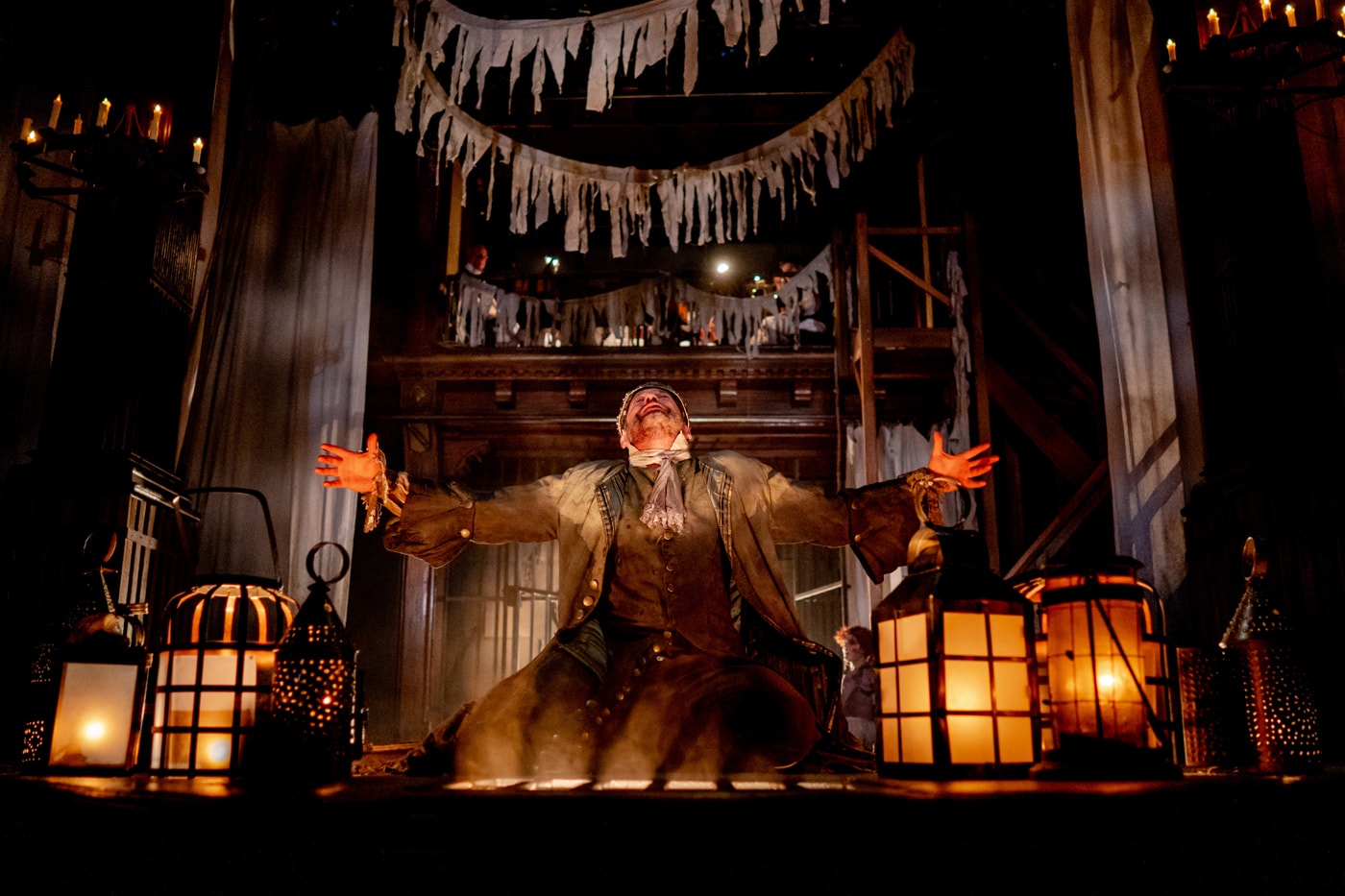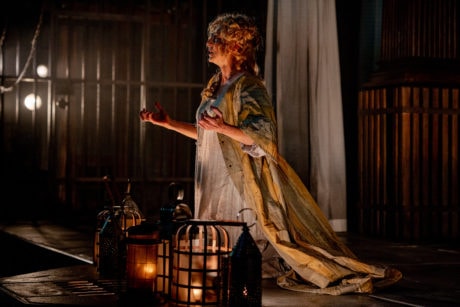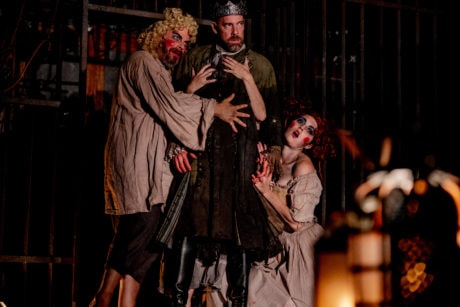If you want to get yourself in the mood for the Folger Theatre’s current hit production of Macbeth – a famous adaptation from the 1660’s of William Shakespeare’s original tragedy, by his godson William Davenant – you might want to have a look at a briskly—paced BBC video featuring the production’s lead researcher, Queens University Belfast Professor Richard Schoch (video below interview).

In this engagingly brief talk, Schoch (pronounced “Shook”) reminds us that for all our love of the original language and the original scripts, the Bard’s work has remained relevant precisely because it has been adapted and altered so many times.
”Shakespeare is indeed for all time, but not in the way you think. Shakespeare’s always the same, but always different,” Dr. Schoch tells us.
The Folger Theatre production of Macbeth marks something of a homecoming for Schoch, who started out some years ago assisting Shakespeare Theatre Company’s Michael Kahn in his famous 60’s-inspired production of Love’s Labours Lost. Since then, Schoch has carved out a niche in academia by tracing the many twists and turns of British theater history. Currently based at Queen’s University, Belfast, Schoch has racked up a number of accolades and is currently heading up a multi-year project, “Performing Restoration Shakespeare,” which is designed to reintroduce theater audiences to the amazing changes that were rung on the Bard’s plays in the heady years after theater was revived during the Restoration period in England – the 1660’s, which were a lot like our own ‘60’s, truth be known…
It’s easy to forget that for years, the British theater didn’t exist: not too long after Shakespeare’s time the theaters were closed, and remained closed after the beheading of King Charles I and the rise to power of Oliver Cromwell, a Puritan whose government ruled England with all the ruthlessness of today’s Taliban. William Davenant’s remarkable career spanned the British theater both before and after Cromwell’s reign, and he famously staged underground performances on private estates. When Cromwell died, Parliament negotiated the restoration of Charles I’s son to the throne. The crowning of Charles II, in 1660, marked the dawn of the Restoration era and the revival of British theater, with Davenant as one of the leading lights.

In eager anticipation of this truly original take on one of the darkest (and briefest) plays in Shakespeare’s canon, I had a brief electronic sit-down with Dr. Schoch to pick his brain about Shakespeare, theater history, and of course the adaptor William Davenant, an actor/playwright whose contribution to English language theater is as enormous as it is uncelebrated.
Dr. Andrew White: As a fellow theater historian, I’m always interested to know what first attracted my colleagues to their specialty. What was the journey that led you to the theater, and then onward to Davenant and the Restoration?
Dr. Richard Schoch: I didn’t start as an academic, but as a stage director right here in DC. One of my first jobs, given to me by Michael Kahn, was as assistant director for a production of Love’s Labor’s Lost. So when I made the move to academia it felt natural to write about Shakespeare in performance, since I already had direct experience with that. I’ve always been fascinated by the past — how people in other times acted and thought differently than we do — and so, putting it all together, I landed in the Restoration — the first generation to do Shakespeare after Shakespeare.
Davenant is a pivotal figure, in that he was part of the theater scene both before and after the Commonwealth period, in which Oliver Cromwell shut down the theaters and banned all but musical performances. What is your assessment of his work before and after this period?
Davenant must have been super-talented, because he wrote plays for 3 different kinds of theaters: before the Puritans closed the theaters and the monarchy was overthrown — all in the 1640s — he wrote plays for public theaters like Blackfriars and also masques (a mash-up of text, music and stage spectacle) for King Charles I and his court; after the theater reopened in 1660, Davenant wrote plays for his own company, the Duke’s Men. Davenant’s true signature style, which he quietly developed in the 1650s, was a combination of brisk heroic drama, stylish music and lavish spectacle. The Restoration theater audience, unlike Shakespeare’s audience, was smaller, more socially exclusive, and even included—for the first time—the King and other royals
Davenant is famous, among other things, for getting around the censors by staging “The Siege of Rhodes” as an “opera” at a private estate under Cromwell. Can you tell us of any other ways in which Davenant worked to preserve the theatrical tradition, or stayed in touch with his colleagues who were (at least officially) out of a job during the Commonwealth years?
Davenant had a lot of run-ins with the law during the Cromwell era and eventually fled to France to avoid arrest for treason. In Paris, he no doubt saw lots of theater and opera. He brought back with him to England the things he liked best about the French stage: baroque music, pictorial scenery and, most importantly, actresses! Only in the Restoration did women finally play women’s roles on the English stage.

Most theater-goers today have no idea that for years, theater in England was effectively banned and the Puritans – whom we know by way of Plymouth Rock and the Salem Witch Trials – ruled over Great Britain with all the ruthlessness of the modern-day fundamentalists. How did this long period of censorship affect the artists of Davenant’s day?
It put a lot of actors out of work. Some turned to other jobs, like running pubs. Some found theater work in other countries. And some, despite the odds, staged illegal performances in what were essentially pop up theaters in London. Inevitably, soldiers stormed the illegal theaters and trashed them. And so when the theaters finally reopened, it was not just a sigh of relief, it was time to party: the theater was back, and bigger and better than ever.
Can you point to a few other plays, or writers, that show us how audiences reacted when Charles II was invited back to London, and Cromwell’s “Commonwealth” brought to an end?
I’ll point you to someone else: Samuel Pepys, civil servant by day and theater fan by night (late afternoon to be precise). His famous diary records his impressions of many visits to the theater and provides great firsthand evidence of how much Restoration Londoners enjoyed a rollicking good time after so many years of being denied the pleasures and charms of city life.
What aspects of Davenant’s adaptation of Macbeth do you think will be especially interesting and/or surprising for Folger Theater audiences? (No need to reveal too much here, we do want to surprise folks).
It will be a treat for the audience, I’m sure. The role of Lady Macduff is much expanded and there are entirely new scenes—you won’t find them in Shakespeare—between Macbeth and Lady Macbeth. There’s a tremendous amount of music, and it’s so important for driving the play forward. The sound of the text — Davenant’s version feels brisker — like a high-speed train whistling down the track. It will be a fun but also a weird experience for the audience: Macbeth, but not as you know it.
The original production of Shakespeare’s “Scottish Tragedy,” as Macbeth is often called, was famously banned after one performance, perhaps because James I had written about witches extensively and regarded them as a very real threat. Were some of the same attitudes, and superstitions, still in play during the Restoration, or were the witches now more stereotypical and fantastical?
Restoration audiences were very sophisticated — at least they believed they were — and they didn’t believe in witches. It was the age of science and reason — Newton came of age in the Restoration. Believing in witches was pure superstition, fit for country bumpkins only. That’s why the witches in Davenant’s Macbeth are so much fun — because no Restoration lady or gentleman would believe in, let alone be frightened by them.
Theater-goers interested in this rich period of British theater history can now access Samuel Pepys’ Diaries online. Are there other sources, available in print or online, that people might enjoy reading as a part of their experience of this show?
You can read Davenant’s version of Macbeth — side by side with Shakespeare’s—for free on the Folger website.
You have recently published “Writing the History of the British Stage, 1660-1900.” I’m curious to know whether (or how) the theater writers, closer to Davenant’s time, acknowledged the long shadow of Cromwell’s reign and what they had to say about the effect the Puritans had on the theater scene.
The first histories of the English stage were written in the Restoration precisely to make sense of the 18 years period — a generation — when theaters were essentially shut down. Plus, these histories were sometimes written by theater insiders: John Downes the prompter, Richard Flecknoe the (failed) playwright, and Francis Kirkman who sold printed plays in his bookshop.
The theatrical profession in the Restoration faced some serious questions: do we do things the old way, like in Shakespeare’s time? Do we make everything new, because theaters had been closed for so long and tastes have changed? or do we split the difference, and mix the old with the new? The answers weren’t so clear at the time, but one way to come up with some answers was to think historically about the theater — its past, present, and future. And that’s the story I tell in my latest book. Thanks, Restoration theater — you made it all possible!
Macbeth plays through September 23, 2018, at the Folger Theatre – 201 East Capitol Street, SE, in Washington, DC. For tickets, call the box office at (202) 544-7077 or go online.




